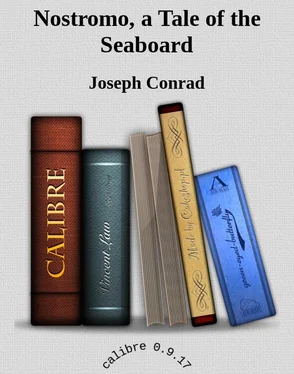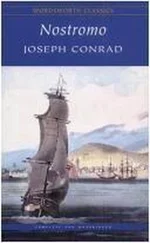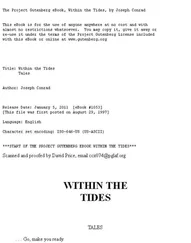Joseph Conrad - Nostromo, a Tale of the Seaboard
Здесь есть возможность читать онлайн «Joseph Conrad - Nostromo, a Tale of the Seaboard» весь текст электронной книги совершенно бесплатно (целиком полную версию без сокращений). В некоторых случаях можно слушать аудио, скачать через торрент в формате fb2 и присутствует краткое содержание. Жанр: Старинная литература, на английском языке. Описание произведения, (предисловие) а так же отзывы посетителей доступны на портале библиотеки ЛибКат.
- Название:Nostromo, a Tale of the Seaboard
- Автор:
- Жанр:
- Год:неизвестен
- ISBN:нет данных
- Рейтинг книги:4 / 5. Голосов: 1
-
Избранное:Добавить в избранное
- Отзывы:
-
Ваша оценка:
- 80
- 1
- 2
- 3
- 4
- 5
Nostromo, a Tale of the Seaboard: краткое содержание, описание и аннотация
Предлагаем к чтению аннотацию, описание, краткое содержание или предисловие (зависит от того, что написал сам автор книги «Nostromo, a Tale of the Seaboard»). Если вы не нашли необходимую информацию о книге — напишите в комментариях, мы постараемся отыскать её.
Nostromo, a Tale of the Seaboard — читать онлайн бесплатно полную книгу (весь текст) целиком
Ниже представлен текст книги, разбитый по страницам. Система сохранения места последней прочитанной страницы, позволяет с удобством читать онлайн бесплатно книгу «Nostromo, a Tale of the Seaboard», без необходимости каждый раз заново искать на чём Вы остановились. Поставьте закладку, и сможете в любой момент перейти на страницу, на которой закончили чтение.
Интервал:
Закладка:
"I know that thing," he muttered to himself, with a sagacious jerk of the head. "That's blood."
His stroke was long, vigorous, and steady. Now and then he looked over his shoulder at the Great Isabel, presenting its low cliff to his anxious gaze like an impenetrable face. At last the stem touched the strand. He flung rather than dragged the boat up the little beach. At once, turning his back upon the sunset, he plunged with long strides into the ravine, making the water of the stream spurt and fly upwards at every step, as if spurning its shallow, clear, murmuring spirit with his feet. He wanted to save every moment of daylight.
A mass of earth, grass, and smashed bushes had fallen down very naturally from above upon the cavity under the leaning tree. Decoud had attended to the concealment of the silver as instructed, using the spade with some intelligence. But Nostromo's half-smile of approval changed into a scornful curl of the lip by the sight of the spade itself flung there in full view, as if in utter carelessness or sudden panic, giving away the whole thing. Ah! They were all alike in their folly, these hombres finos that invented laws and governments and barren tasks for the people.
The Capataz picked up the spade, and with the feel of the handle in his palm the desire of having a look at the horse-hide boxes of treasure came upon him suddenly. In a very few strokes he uncovered the edges and corners of several; then, clearing away more earth, became aware that one of them had been slashed with a knife.
He exclaimed at that discovery in a stifled voice, and dropped on his knees with a look of irrational apprehension over one shoulder, then over the other. The stiff hide had closed, and he hesitated before he pushed his hand through the long slit and felt the ingots inside. There they were. One, two, three. Yes, four gone. Taken away. Four ingots. But who? Decoud? Nobody else. And why? For what purpose? For what cursed fancy? Let him explain. Four ingots carried off in a boat, and—blood!
In the face of the open gulf, the sun, clear, unclouded, unaltered, plunged into the waters in a grave and untroubled mystery of self-immolation consummated far from all mortal eyes, with an infinite majesty of silence and peace. Four ingots short!—and blood!
The Capataz got up slowly.
"He might simply have cut his hand," he muttered. "But, then——"
He sat down on the soft earth, unresisting, as if he had been chained to the treasure, his drawn-up legs clasped in his hands with an air of hopeless submission, like a slave set on guard. Once only he lifted his head smartly: the rattle of hot musketry fire had reached his ears, like pouring from on high a stream of dry peas upon a drum. After listening for a while, he said, half aloud—
"He will never come back to explain."
And he lowered his head again.
"Impossible!" he muttered, gloomily.
The sounds of firing died out. The loom of a great conflagration in Sulaco flashed up red above the coast, played on the clouds at the head of the gulf, seemed to touch with a ruddy and sinister reflection the forms of the Three Isabels. He never saw it, though he raised his head.
"But, then, I cannot know," he pronounced, distinctly, and remained silent and staring for hours.
He could not know. Nobody was to know. As might have been supposed, the end of Don Martin Decoud never became a subject of speculation for any one except Nostromo. Had the truth of the facts been known, there would always have remained the question. Why? Whereas the version of his death at the sinking of the lighter had no uncertainty of motive. The young apostle of Separation had died striving for his idea by an ever-lamented accident. But the truth was that he died from solitude, the enemy known but to few on this earth, and whom only the simplest of us are fit to withstand. The brilliant Costaguanero of the boulevards had died from solitude and want of faith in himself and others.
For some good and valid reasons beyond mere human comprehension, the sea-birds of the gulf shun the Isabels. The rocky head of Azuera is their haunt, whose stony levels and chasms resound with their wild and tumultuous clamour as if they were for ever quarrelling over the legendary treasure.
At the end of his first day on the Great Isabel, Decoud, turning in his lair of coarse grass, under the shade of a tree, said to himself—
"I have not seen as much as one single bird all day."
And he had not heard a sound, either, all day but that one now of his own muttering voice. It had been a day of absolute silence—the first he had known in his life. And he had not slept a wink. Not for all these wakeful nights and the days of fighting, planning, talking; not for all that last night of danger and hard physical toil upon the gulf, had he been able to close his eyes for a moment. And yet from sunrise to sunset he had been lying prone on the ground, either on his back or on his face.
He stretched himself, and with slow steps descended into the gully to spend the night by the side of the silver. If Nostromo returned—as he might have done at any moment—it was there that he would look first; and night would, of course, be the proper time for an attempt to communicate. He remembered with profound indifference that he had not eaten anything yet since he had been left alone on the island.
He spent the night open-eyed, and when the day broke he ate something with the same indifference. The brilliant "Son Decoud," the spoiled darling of the family, the lover of Antonia and journalist of Sulaco, was not fit to grapple with himself single-handed. Solitude from mere outward condition of existence becomes very swiftly a state of soul in which the affectations of irony and scepticism have no place. It takes possession of the mind, and drives forth the thought into the exile of utter unbelief. After three days of waiting for the sight of some human face, Decoud caught himself entertaining a doubt of his own individuality. It had merged into the world of cloud and water, of natural forces and forms of nature. In our activity alone do we find the sustaining illusion of an independent existence as against the whole scheme of things of which we form a helpless part. Decoud lost all belief in the reality of his action past and to come. On the fifth day an immense melancholy descended upon him palpably. He resolved not to give himself up to these people in Sulaco, who had beset him, unreal and terrible, like jibbering and obscene spectres. He saw himself struggling feebly in their midst, and Antonia, gigantic and lovely like an allegorical statue, looking on with scornful eyes at his weakness.
Not a living being, not a speck of distant sail, appeared within the range of his vision; and, as if to escape from this solitude, he absorbed himself in his melancholy. The vague consciousness of a misdirected life given up to impulses whose memory left a bitter taste in his mouth was the first moral sentiment of his manhood. But at the same time he felt no remorse. What should he regret? He had recognized no other virtue than intelligence, and had erected passions into duties. Both his intelligence and his passion were swallowed up easily in this great unbroken solitude of waiting without faith. Sleeplessness had robbed his will of all energy, for he had not slept seven hours in the seven days. His sadness was the sadness of a sceptical mind. He beheld the universe as a succession of incomprehensible images. Nostromo was dead. Everything had failed ignominiously. He no longer dared to think of Antonia. She had not survived. But if she survived he could not face her. And all exertion seemed senseless.
On the tenth day, after a night spent without even dozing off once (it had occurred to him that Antonia could not possibly have ever loved a being so impalpable as himself), the solitude appeared like a great void, and the silence of the gulf like a tense, thin cord to which he hung suspended by both hands, without fear, without surprise, without any sort of emotion whatever. Only towards the evening, in the comparative relief of coolness, he began to wish that this cord would snap. He imagined it snapping with a report as of a pistol—a sharp, full crack. And that would be the end of him. He contemplated that eventuality with pleasure, because he dreaded the sleepless nights in which the silence, remaining unbroken in the shape of a cord to which he hung with both hands, vibrated with senseless phrases, always the same but utterly incomprehensible, about Nostromo, Antonia, Barrios, and proclamations mingled into an ironical and senseless buzzing. In the daytime he could look at the silence like a still cord stretched to breaking-point, with his life, his vain life, suspended to it like a weight.
Читать дальшеИнтервал:
Закладка:
Похожие книги на «Nostromo, a Tale of the Seaboard»
Представляем Вашему вниманию похожие книги на «Nostromo, a Tale of the Seaboard» списком для выбора. Мы отобрали схожую по названию и смыслу литературу в надежде предоставить читателям больше вариантов отыскать новые, интересные, ещё непрочитанные произведения.
Обсуждение, отзывы о книге «Nostromo, a Tale of the Seaboard» и просто собственные мнения читателей. Оставьте ваши комментарии, напишите, что Вы думаете о произведении, его смысле или главных героях. Укажите что конкретно понравилось, а что нет, и почему Вы так считаете.












